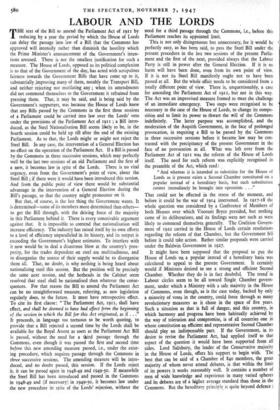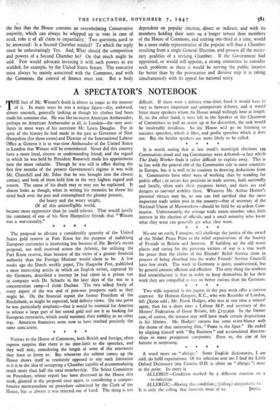LABOUR AND THE LORDS
THE text of the Bill to amend the Parliament Act of 1911 by reducing by a year the period by which the House of Lords can delay the passage into law of a Bill that the Commons has approved will intensify rather than diminish the hostility which the Prime Minister's announcement of the Government's inten- tions aroused. There is not the smallest justification for such a measure. The House of Lords, opposed as its political complexion is to that of the Government of the day, has acted with scrupulous fairness towards the Government Bills that have come up to it, substantially improving many of them, notably the Transport Bill, and neither rejecting nor mutilating any ; when its amendments did not commend themselves to the Government it refrained from pressing them. That, it may be said, and is being said by the Government's supporters, was because the House of Lords knew that any Bills passed by the Commons in the first three sessions of a Parliament could be carried into law over the Lords' veto under the provisions of the Parliament Act of 1911 ; a Bill intro- duced, as the Steel Nationalisation Bill seems likely to be, in the fourth session could be held up till after the end of the existing Parliament. As to that, the Lords might or might not reject the Steel Bill. In any case, the intervention of a General Election has no effect on the operation of the Parliament Act. If a Bill is passed by the Commons in three successive sessions, which may perfectly well be the last two sessions of an old Parliament and the first of a new, it becomes law in spite of the Lords. There is no vital urgency, even from the Government's point of view, about the Steel Bill ; if there were it would have been introduced this session. And from the public point of view there would be substantial advantage in the intervention of a General Election during the Bill's passage, so that the country might pronounce on it.
But that, of course, is the last thing the Government wants. It is determined—some of its members more determined than others— to get the Bill through, with the driving force of the majority in this Parliament behind it. There is every conceivable argument against that. It is impossible to contend that nationalisation will increase efficiency. The industry has raised itself by its own efforts to a level of efficiency unparalleled in its history, and its output is exceeding the Government's highest estimates. To interfere with it now would be to deal a disastrous blow at the country's pros- perity, for the trades dependent on steel are multitudinous, and to disorganise the source of their supply would be to disorganise them all. That, no doubt, is why nothing is being heard about nationalising steel this session. But the position will be precisely the same next session, and the hotheads in the Cabinet seem resolved that steel shall be nationalised then whatever the conse- quences. For that reason the Bill to amend the Parliament Act can be no straightforward measure, referring, as new legislation regularly does, to the future. It must have retrospective effect. To cite its first clause: " The Parliament Act, 1911, shall have effect, and shall be deemed to have had effect from the beginning of the session in which the Bill for- this Act originated, as if . . ." It proceeds, in language too tortuous to be worth quoting, to provide that a Bill rejected a second time by the Lords shall be available for the Royal Assent as soon as the Parliament Act Bill is passed, without the need for a third passage through the Commons, even though it was passed the first and second time before this new amending measure passed, i.e., under the exist- ing procedure, which requires passage through the Commons in three successive sessions. The amending measure will be intro- duced, and no doubt passed, this session. If the Lords reject it, it can be passed again in 1948-49 and 1949-50. If meanwhile the Steel Bill has been introduced and passed in the Commons in 1948-49 and (if necessary) in 1949-50, it becomes law under the new procedure in spite of the Lords' rejection, without the need for a third passage through the Commons, i.e., before this Parliament reaches its appointed limit.
This is not only disingenuous but unnecessary, for it would be perfectly easy, as has been said, to pass the Steel Bill under the present procedure in the last two sessions of the present Parlia- ment and the first of the next, provided always that the Labour Party is still in power after the General Election. If it is no harm will have been done, even from its own point of view. If it is not its Steel Bill manifestly ought not to have been passed at all. But the whole .affair needs to be considered from a totally different point of view. There is, unquestionably, a case for amending the Parliament Act of 1911, but not in this way. The Act was an improvised measure framed to meet the challenge of an immediate emergency. Two steps were recognised to be necessary in the case of the House of Lords, to change its compo- sition and to limit its power to thwart the will of the Commons indefinitely. The latter purpose was accomplished, and the moderation of the Asquith Government, in the face of prolonged provocation, in requiring a Bill to be passed by the Commons in three successive sessions before it became law may be con- trasted with the precipitancy of the present Government in the face of no provocation at all. What was left over from the Parliament Act of 1911 was the reform of the House of Lords itself. The need for such reform was explicitly recognised in the preamble of the Act, which read: " And whereas it is intended to substitute for the House of Lords as it present exists a Second Chamber constituted on a popular instead of a hereditary basis, but such substitution cannot immediately be brought into operation. . . ."
That could not be effected in the stress of the moment, and before it could be the war of 1914 intervened. In 1917-18 the whole question was considered by a Conference of Members of both Houses over which Viscount Bryce presided, but nothing came of its deliberations, and its findings were not such as were likely to commend themselves generally. The Coalition Govern- ment of 1922 carried in the House of Lords certain resolutions regarding the reform of that Chamber, but the Government fell before it could take action. Rather similar proposals were carried under the Baldwin Government in 1927.
It might have been supposed that the proposal to put the House of Lords on a popular instead of a hereditary basis was calculated to appeal to the present Government. It certainly would if Ministers desired to see a strong and efficient Second Chamber. Whether they do is in fact doubtful. The trend in Labour circles seem to be all toward Single Chamber govern- ment, under which a Ministry with a safe majority in the House of Commons, even though, as is the case today, backed by only a minority of votes in the country, could force through as many revolutionary measures as it chose in the space of five years. Such a situation as that is full of danger, and this country, in which harmony and progress have been habitually achieved by the way of toleration and compromise, is of all countries one in whose constitution an efficient and representative Second Chamber should play an indispensable part. If the Government, in its desire to revise the Parliament Act, had applied itself to that aspect of the question it would have been supported from all sides. Lord Salisbury, the leader of the Conservative majority in the House of Lords, offers his support to begin with. The best that can be said of a Chamber of 84o members, the great majority of whom never attend debates, is that within the limit of its powers it works reasonably well. It contains a number of men of wide knowledge and experience in many varied spheres and its debates are of a higher average standard than those in the Commons. But the hereditary principle is quite beyond defence ; the fact that the House contains an overwhelming Conservative majority, which can always be whipped up to vote in case of need, robs it of all claim to impartiality. Two questions need to be answered: Is a Second Chamber needed? To which the reply must be unhesitatingly Yes. And, What should the composition and powers of a Second Chamber be? On that much might be said. Few would advocate investing it with such powers as are wielded, for example, by the United States Senate. The executive must always be mainly associated with the Commons, and with the Commons the control of finance must rest. But a body dependent on popular election, direct or indirect, and with its members holding their seats on a longer tenure than members of the House of Commons, and retiring one-third at a time, would be a more stable representative oUthe popular will than a Chamber resulting from a single General Election, and possess all the neces- sary qualities of a revising Chamber. If the Government had appointed, or would still appoint, a strong committee to consider such problems as these it would be serving the public interest far better than by the provocative and divisive step it is taking simultaneously with its appeal for national unity.



































 Previous page
Previous page